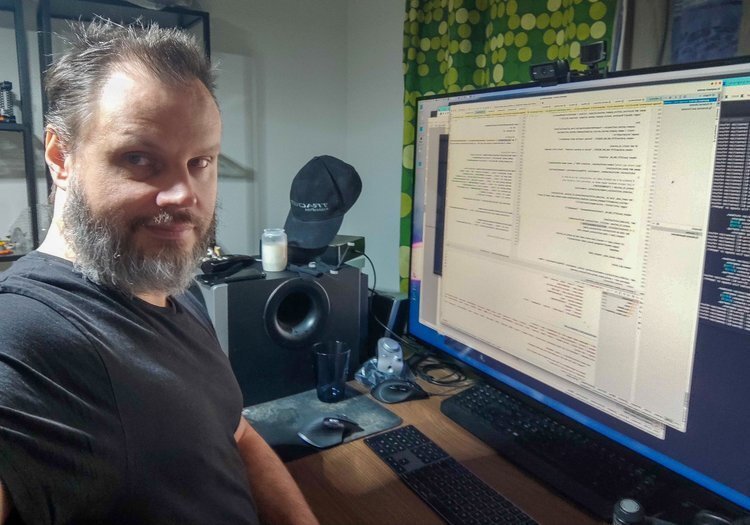Returnees – 1/2: Greener on the other side?
We asked the two Rakettitiede returnee developers how they first ended up at Rakettitiede, what made them leave and, most importantly, why they decided to step aboard the Rocket again. The interview will be published in two parts – read the first instalment below.
The doors of IT companies are known to revolve fast, and not even Rakettitiede has been able to retain all its talents. As grey as the cloud of employee wastage sometimes is, there is a gold lining: people leaving the Rocket do not join the ranks of our competitors; instead, they disembark to seize “once in a lifetime” opportunities. They are employed by product houses to develop space technology or take off their moon boots to walk in the shoes of a private entrepreneur.
And that’s not all folks: The Rocket also hosts some returnees! We interviewed two of our developers who once ventured out to experience the greenness of code on the other side of the fence. Much to our delight, they decided to return to our little troupe of merry astronauts.
Openness made a lasting impression
For Ed, Rakettitiede felt like home right from the start. Still, he thinks that spending couple of years with space technology was a great experience.
Edvard, or Ed to his friends, a.k.a. Rocket Scientist #20, was led to Rakettitiede in 2017 by rockets – what else.
“I used to play a simulation called Kerbal Space Program, which models the essentials of orbital mechanics, largely abstracting other less important issues related to space flights,” Ed explains.
Entering the words “rocket science in Finland” into a search engine landed Ed on Rakettitiede’s website. Although Ed soon realised that launching rockets wasn’t the company’s main line of business (at least not yet?), the Helsinki-based consultancy started to seem like an alluring opportunity.
“I was happy with my job at the time, but I had just moved from Tampere to the Helsinki area and working for a nearby consultancy began to feel like a good idea.”
Location, location, location wasn’t Ed’s top reason for changing jobs, however. Instead, the deal was sealed by genuine and approachable colleagues, excellent compensation and responsible management.
“They were very open from the get-go and even told me about points of development that the company still needed to work on – I didn’t even have to ask. I don’t ever remember anyone gaining my trust so quickly. Their openness and honesty made a lasting impression – it felt like coming home.”
Jyri, rocket scientist #17, boarded the rocket a bit earlier than Ed.
“My former boss introduced me to Juha in the autumn of 2016. I met Juha and Arttu over lunch, and felt really good afterwards. We signed the agreement and about three weeks after the first meeting I already found myself working in a client project,” Jyri recounts.
It all started with Commodors
Both rocket scientists have been enthralled by the magic of computing since the golden 80s, when machines were simpler and hardware-based programming seemed to interest every little nerd.
“Computing is something that has fascinated me since the era of Commodores in the 80s, but I really became interested in programming in the mid-90s,” Jyri says.
Over the course of 20 years, he’s worked on countless projects and been able to create demanding pieces of software, such as payment services and telecom systems, that really need to work.
Ed’s technical career began, in his own words, with an unnatural interest in mathematics. “At the end of lower secondary school, I used my paper route money to buy myself a used programmable calculator with a mind-blowing 496 symbols of memory. With it, I created programs for prime factorisation, combinations and permutations. Discrete maths was the most exciting thing ever!” Ed exclaims.
Ed didn’t end up studying mathematics, however. Instead, he found himself at the Tampere University of Technology, where he wanted to do “something cool,” like programme robots.
“I soon realised I wasn’t fully in tune with electronics or mechanics, so I began making simple programs in a *nix environment. Later I moved on to studying software production and computer science but unfortunately couldn’t properly motivate myself anymore once work opportunities started popping up,” Ed says.
Why leave the Rocket?
After a couple of years as a rocket scientist, Ed’s good friend offered him a job in space technology. “I couldn’t have even dreamt about doing any space-related stuff – and with a good friend, no less. I had nothing bad to say about the Rocket, but I couldn’t miss out on such a unique opportunity.”
An interesting start-up in the financial sector paused Jyri's Rocket trip for two years.
Jyri left the Rocket after a three-year stint. “A long client project had just come to a close and the start of a potential new project was delayed after the summer holiday. Around the same time, I was asked to work in an interesting start-up in the financial sector with some people I knew. The technology they used was interesting and provided a welcome change. Simply put, the temptation became too great. My salary dropped quite a bit, though.”
Jyri worked for the start-up for 2 years. Ed strayed for more than two and half years but feels the break was a good thing. “I still think I made the right decision, even though I eventually returned to the Rocket.”
What happened next? Hold your horses – in the next instalment, we’ll let you know why Ed and Jyri dusted off their moon suits and boarded the mother ship for the second time.
Looking for interesting projects, competent colleagues and a good salary? Click here to read more!
Read more:
Returnees – 2/2: Return to the Rocket
Stocking up on shares – many Rocket Scientists are also shareholders



